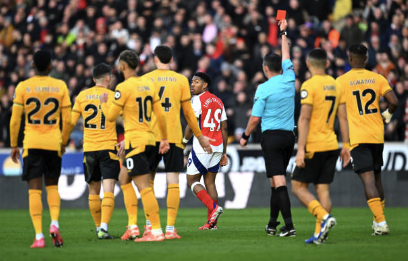English Football is broken
What needs to change in the English Premier League
David Hole
1/26/2025


Football is severely broken.
The obvious VAR issues rose to the surface again after last weekend's debacle unravelled, and then it became an exercise in how to save face without saying sorry.
The obvious has been written, but there is a bit more to things this time, and it needs to be called out.
Football is enjoyable because it's dynamic, fluent, questionable, and, above all, emotional.
After more than 50 years of going to football matches, I have lost count of how many times I have come out of the ground moaning about refereeing decisions, contentious incidents, or sheer unbelievable moments of skill. After all, that is why you go to football, to experience that emotion regularly and to believe that what you see is not only fair but also shrouded in luck, the rub of the green, or whatever else you want to call it.
Sadly, I have questioned this for some time now.
We are seeing a poor level of refereeing that is getting worse. VAR is hindering the referees, and like all humans, they are adapting to the rules surrounding VAR to avoid appearing out of their depth when refereeing Premier League games.
Michael Oliver made a huge mistake when he sent off Myles Lewis-Skelley. The rights and wrongs of that decision are not what this article is about. Still, because VAR decided that Oliver had seen the incident and clearly made a decision with the full facts of what he had seen, they upheld his decision that it was a dangerous, out-of-control tackle and that they would agree that he had to see the red card. What should have happened is that when Oliver decided to give the foul, if he, at that point, thought it was a red card, he should have spoken immediately to the VAR team for a second opinion and then checked the monitor himself to ensure that before he made what was going to be a game-changing decision, it was correct.
That didn't happen, and the fallout from the process undertaken during that game has been extensive. However, things have moved past a decision based on a lack of process this time. Multiple persons and establishments produced data to highlight disparities that are very hard to argue against.
So why does the data show a bias against certain clubs when certain referees are in charge?
What is happening now is that the referee's control over a game has been diminished by VAR, the Football Association, and, above all, social media.
What you have now that we have never had before is a poor process being validated by media investigation. 'Make a mistake', and a torrent of data is thrown at the issue for us to make whatever we want of it.
In addition, teams such as Arsenal are controlling the game like never before. The longer time it takes for corners, throw-ins, free kicks, and other set-piece situations is adding to the referees' lack of control, so they are overcompensating. They are taking the rules they can enforce and enforcing them in a way that is hindering the game.
When Declan Rice received a second yellow card against Brighton early in the season, the referee could have approached him and said, "Come on, Declan, behave yourself." Problem solved, but his desire to be seen as in control meant he was happy to hide behind the rulebook VAR would underwrite.
The Premier League package that is bolted to every game means that referees believe that they are part of that package and that they are becoming as important as the players to the overall delivery of the Premier League experience. This is, of course, actually happening, but not in a way that is complimenting the game.
VAR needs to be changed to be complimentary and not a 'clear and obvious' ratification exercise.
It remains to be seen if the FA can work out the issues before next season gets underway.
The "clear and obvious" mantra has to change for next season, and it needs to be worded very carefully so there can be no excuses or misunderstandings. VAR needs to be able to advise on games, and referees need to be able to use it to complement their decisions not feel they are being replaced. Getting the right decision needs to be paramount, but this also has to be conveyed to people in the ground so they understand what is going on. The days of rioting because of contentious decisions are probably now firmly in the memories of the 80s and 90s, so treat your audience with the respect it deserves and tell the crowd in the ground why the decision is being made.
Will this happen, I am not so sure. Do I have confidence in the PGMOL to step in and sort this debacle out, well thats an easy one, No!. I think we are looking at an upgrade of the PGMOL, with better people who are fit for purpose running things, and this will happen sooner rather than later, because its damaging the package. FA Premier league football is a multi-billion pound business and needs to be run by people and organisations who are fit for purpose.
